
Foreign relations and diplomacy: An outstanding highlight in the broader achievements of Vietnam
Latest
2023 marks the mid-point in the implementation of the 13th National Party Congress, and also observes the 32nd Diplomatic Conference. Mr. Minister, please give us a brief overview of the most striking achievements in diplomacy since the 31st Diplomatic Conference and over the first half-term?
We are well aware that since the 13th National Party Congress, the international and domestic landscapes have witnessed, in addition to opportunities and good tidings, a great many rapid and complex developments above and beyond expectation. More challenges and adversities have arisen, fiercer than before.
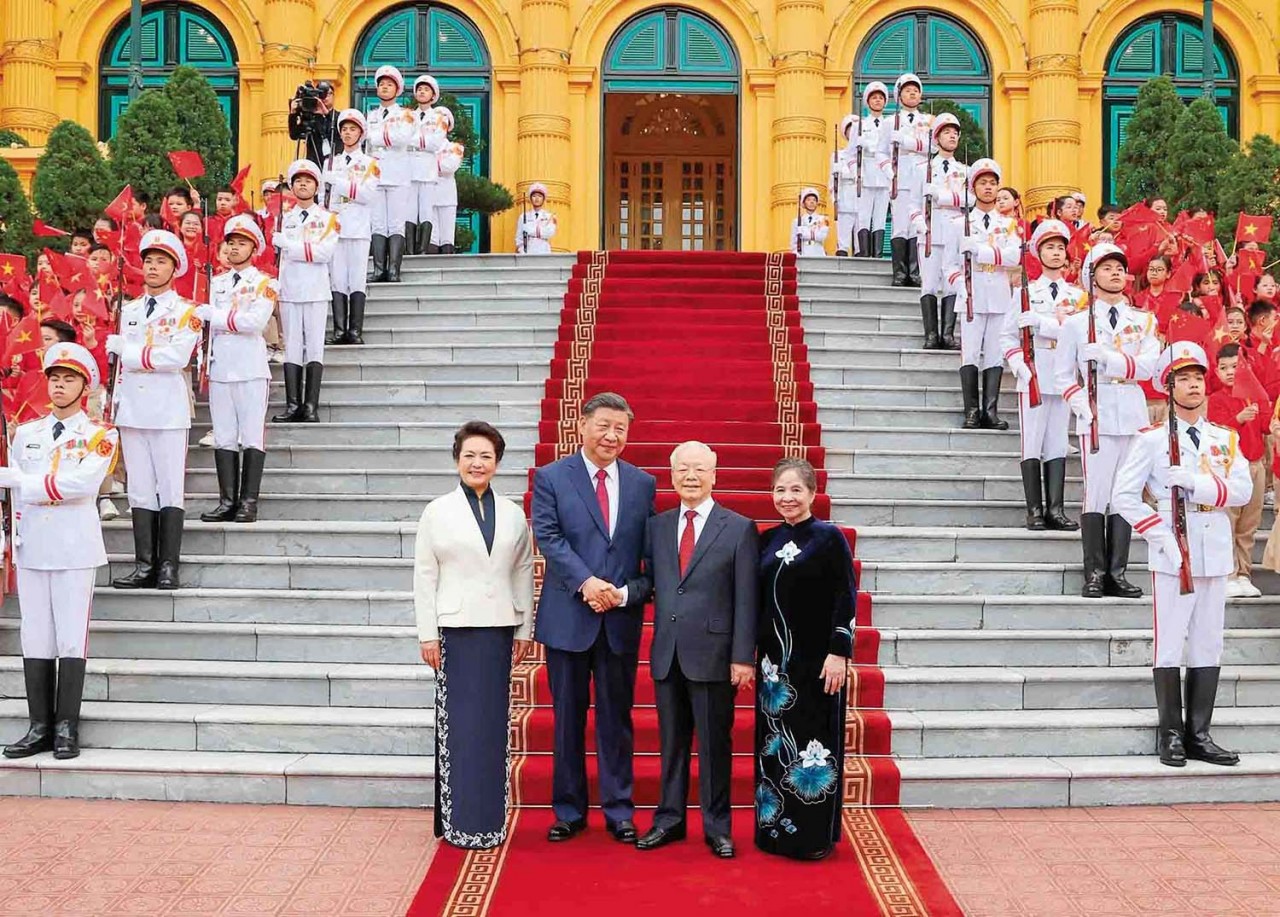 |
| General Secretary Nguyen Phu Trong and his Spouse hosted the official welcome ceremony for General Secretary, President of China Xi Jinping and his Spouse on December 12. (Photo: WVR) |
Against this backdrop, the diplomatic service’s tasks and requirements have grown heftier. Yet we can say that thanks to the extraordinary effort of the entire Party, people and army, Viet Nam’s foreign relations and diplomacy have proven the character of the Vietnamese “bamboo diplomacy”, and stand out as a beacon within the broader triumphs of the country. To elaborate:
First, the foreign policy line set by the 13th National Party Congress has been well-understood and implemented in a synchronized, consistent and effective manner. The Party Central Committee, the Politburo and the Secretariat have adopted numerous important foreign relations programs and issued Resolutions, Directives and Conclusions to elaborate on the foreign policy line of the 13th National Party Congress. These include the Resolution of the 8th Party Central Meeting under the 13th term on the strategy for national defense in a new situation, Resolution 34 of the Politburo on the key lines of action to implement the foreign policy of the 13th National Party Congress, conclusions and directives regarding relations with key and important partners, ASEAN cooperation, Mekong sub-regional cooperation, economic diplomacy, overseas Vietnamese affairs, and people-to-people diplomacy, just to name a few.
Second, it has further reinforced an open diplomacy to facilitate national development and defense in a new stage. The success of the visits and telephone calls by the leaders of the Party and the State, most strikingly the 45 visits by prominent Vietnamese leaders to neighboring countries, strategic partners, nearly all ASEAN member states, and a wide range of important partners and traditional friends, and nearly 50 visits by other countries’ leaders to Viet Nam have brought about a new qualitative growth in Viet Nam’s foreign relations and international integration. At the same time, the country’s diplomatic relations with a wide range of key partners have been elevated to greater heights. Political trust with various countries has been firmly consolidated while international cooperation has become broader and more substantive.
| These results also prove the value of the unique Vietnamese school of diplomacy, grounded in the Ho Chi Minh Diplomatic Thoughts, immersed in the soul, character, spirit and tradition of the nation’s diplomacy of amity, and refinement of the quintessence of mankind’s philosophy. |
Third, diplomacy has played a vanguard role in reinforcing the environment of peace and stability, and in defending the Fatherland. While the world has undergone relentless and incredibly complex changes, Viet Nam has been able to chart a correct course in navigating diplomatic issues and managing relations with our partners. This is grounded in our perseverance with national independence, self-reliance, amity and goodwill while employing flexible strategies and treatment. Additionally, we have taken the initiative in advancing dialogue and accordingly made important gains in border demarcation and addressing certain issues related to national boundary on the basis of respecting international law and steadfastly defending national independence, sovereignty and territorial integrity.
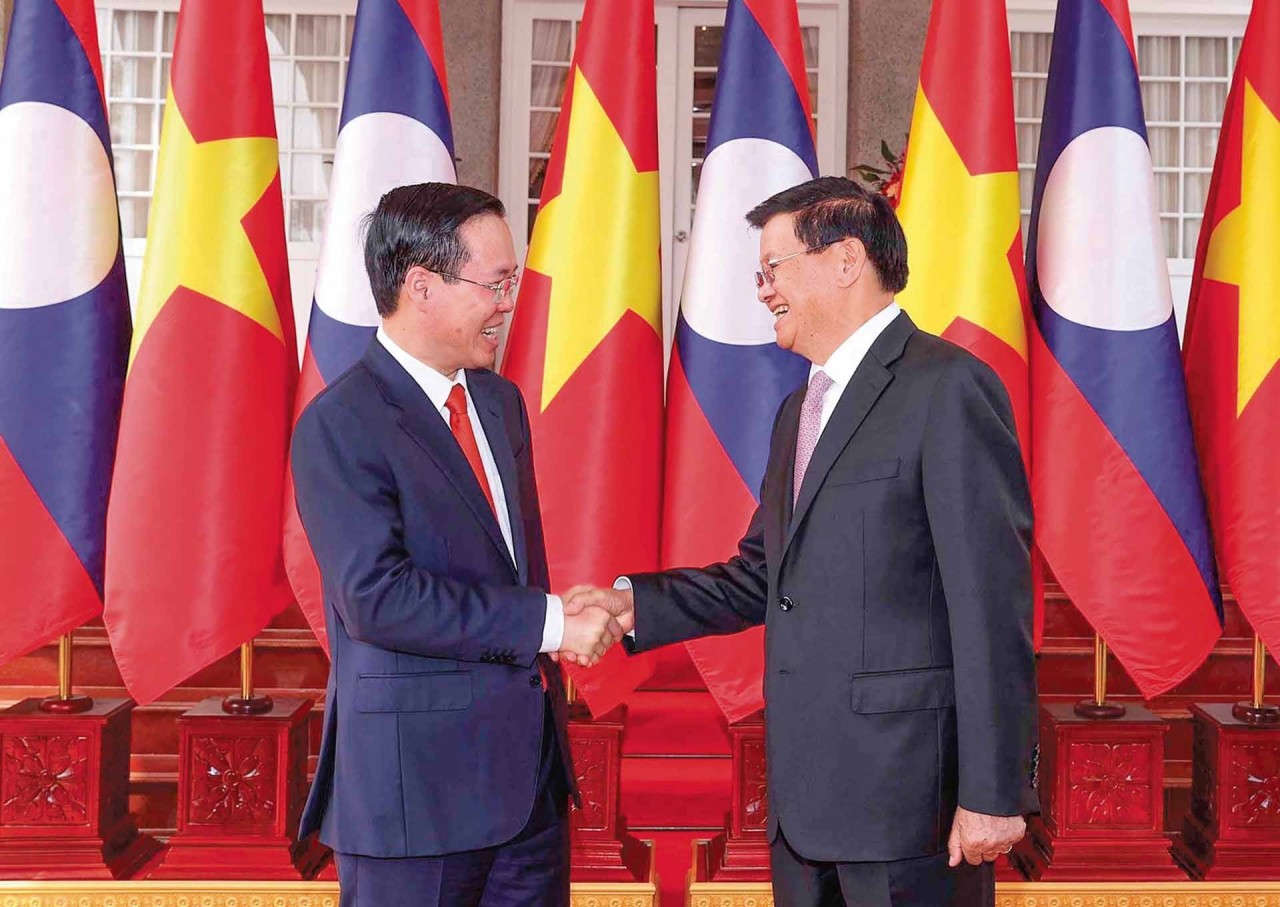 |
| General Secretary of the Lao People’s Revolutionary Party and President of Laos Thongloun Sisoulith received President Vo Van Thuong who was paying a visit to Laos from April 10-11, 2023. (Photo: VNA) |
Fourth, the foreign service was at the forefront in mustering external resources, thus making an important contribution to the effective containment of COVID-19 and rapid socio-economic development. “Vaccine diplomacy” was a direct contributor to the success of the national vaccination strategy, paving the way for curbing COVID-19. We have made good use of free trade agreements and new development trends to boost foreign trade and attract investment and foreign scientific and technological advancements. This has helped Vietnam maintain macroeconomic stability and advance economic growth, and made Vietnam a shining beacon in the grey panorama of the global economy.
Fifth, Viet Nam’s international profile and reputation continues to grow.
Vietnam was elected to and assumed important international offices and duties, especially within ASEAN and the United Nations. For example, Viet Nam was a non-permanent member of the UNSC, a Vice President of the UNGA-77, member of the UNHRC, a member of the World Heritage Committee and International Law Commission, among others. Vietnam is an active contributor to global issues, such as climate action and emission reduction, and has sent her men and women in uniform to join in peacekeeping missions and humanitarian efforts in the disaster or conflict-stricken countries. It can be said that never before has Vietnam enjoyed such a prominent standing, reputation and image as an independent, self-reliant nation of dynamic growth, a faithful and true friend, a reliable partner, and an active and responsible member of the international community as we do today.
These achievements are a vivid testament to the judicious foreign policy line of the Party and the State, and the meticulous and well-informed leadership of the Party Central Committee, the Politburo, the Secretariat, and the leaders of the Party and the State. They stand as an embodiment of the efforts of all services, levels and the entire political system, including an important contribution of foreign relations organs and the entire diplomatic service. These results also prove the value of the unique Vietnamese school of diplomacy, grounded in the Ho Chi Minh Diplomatic Thoughts, immersed in the soul, character, spirit and tradition of the nation’s diplomacy of amity, and refinement of the quintessence of mankind’s philosophy.
This year witnessed a wide range of vigorous and striking diplomatic endeavors against a turbulent global backdrop. What are the most striking and meaningful highlights of Vietnam’s foreign relations and diplomacy this year? What factors have contributed to the success of Vietnam’s diplomacy this year?
2023 has been a year of active diplomatic endeavors, bearing many striking highlights. First of all, diplomatic relations at the bilateral and multilateral levels continued to be broadened and deepened. Relations with many important partners have been elevated to greater heights marked by qualitative growth, most notably relations with China, the United States, Japan, and many others. Diplomatic undertakings, especially high-level diplomacy, were vigorously conducted across the continents and at various key multilateral forums and mechanisms, such as the ASEAN, UN, Mekong Sub-region, APEC, AIPA, COP-28, and BRI, to name a few. Viet Nam continued to play an active role at prominent international organizations, such as the UNHRC and the UNESCO, and made substantive and responsible contributions to the common affairs of the world, such as climate action, peacekeeping efforts in Africa, and disaster rescue and relief in Turkey, among others.
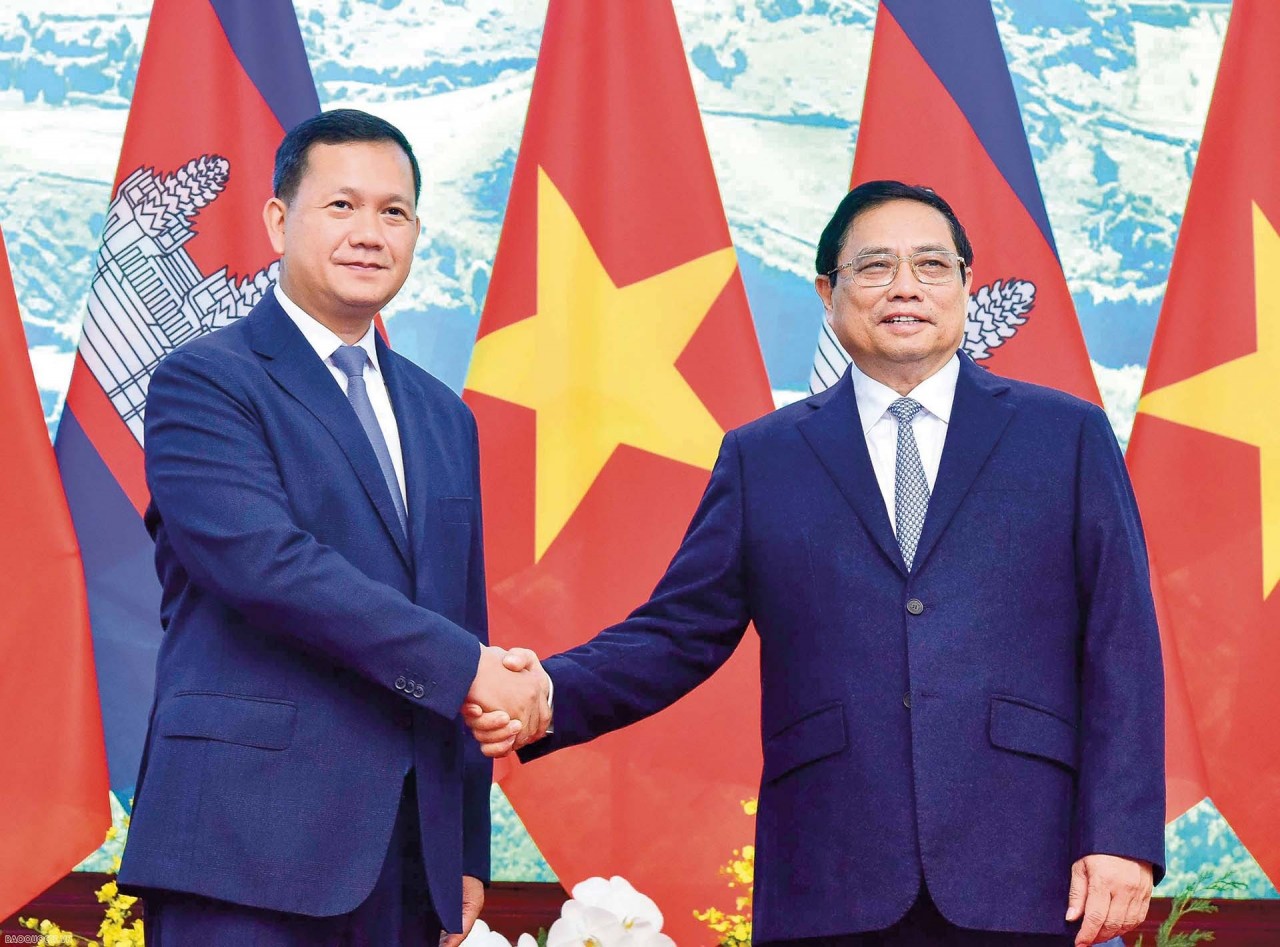 |
| Prime Minister Pham Minh Chinh received Cambodian Prime Minister Hun Manet who was visiting Vietnam from December 11-12, 2023. (Photo: VNA) |
Important gains have been made in strategic research, advice and forecasting in the diplomatic domain. Against the extremely complicated international landscape, the diplomatic service alongside other relevant services and levels serves as a think tank for the Politburo, the Secretariat and the Government in adopting important diplomatic policy decisions, especially those relating to the development of relations with key partners, ASEAN cooperation, Mekong sub-regional cooperation, and proper responses to other countries’ initiatives.
Economic diplomacy continued to be strengthened on the basis of taking full consideration of Directive 15 of the Secretariat, identifying the locality, businesses and people as the heart of service. Economic diplomacy activities were an important contributor to advancing economic growth. This year, foreign trade is at nearly $700 billion, with more than 30 trade items worth over 1 billion USD in terms of export turnover. FDI inbound grew by 14.8% and access to new, quality sources of financing were secured against the backdrop of an ailing global economy.
The environment of peace and stability for national development continues to be firmly maintained. Given the tumultuous international developments, the foreign service alongside the defense and security services and other branches and at all levels have persevered with advancing dialogue and negotiation to address national boundary and territorial issues, handle properly and in a timely way violations of Vietnam’s independence, sovereignty, and sovereign rights and interests.
Diplomatic information, cultural diplomacy, overseas Vietnamese affairs and citizen protection also recorded remarkable gains. Earlier this year, Ha Long Bay and the Cat Ba Archipelago were recognized by the UNESCO as a World Cultural Heritage. Two more cities – Da Lat and Hoi An – were recognized as UNESCO Creative Cities. Viet Nam was elected to important UNESCO offices, such as Vice Presidency of the UNESCO General Conference, Vice Presidency of the Intergovernmental Committee for the Safeguarding of Intangible Cultural Heritage, and member of the World Heritage Committee for 2023-2027, among others. We have given timely citizen protection to our nationals in distress, safely repatriating many of our nationals, especially from places affected by war or natural disasters.
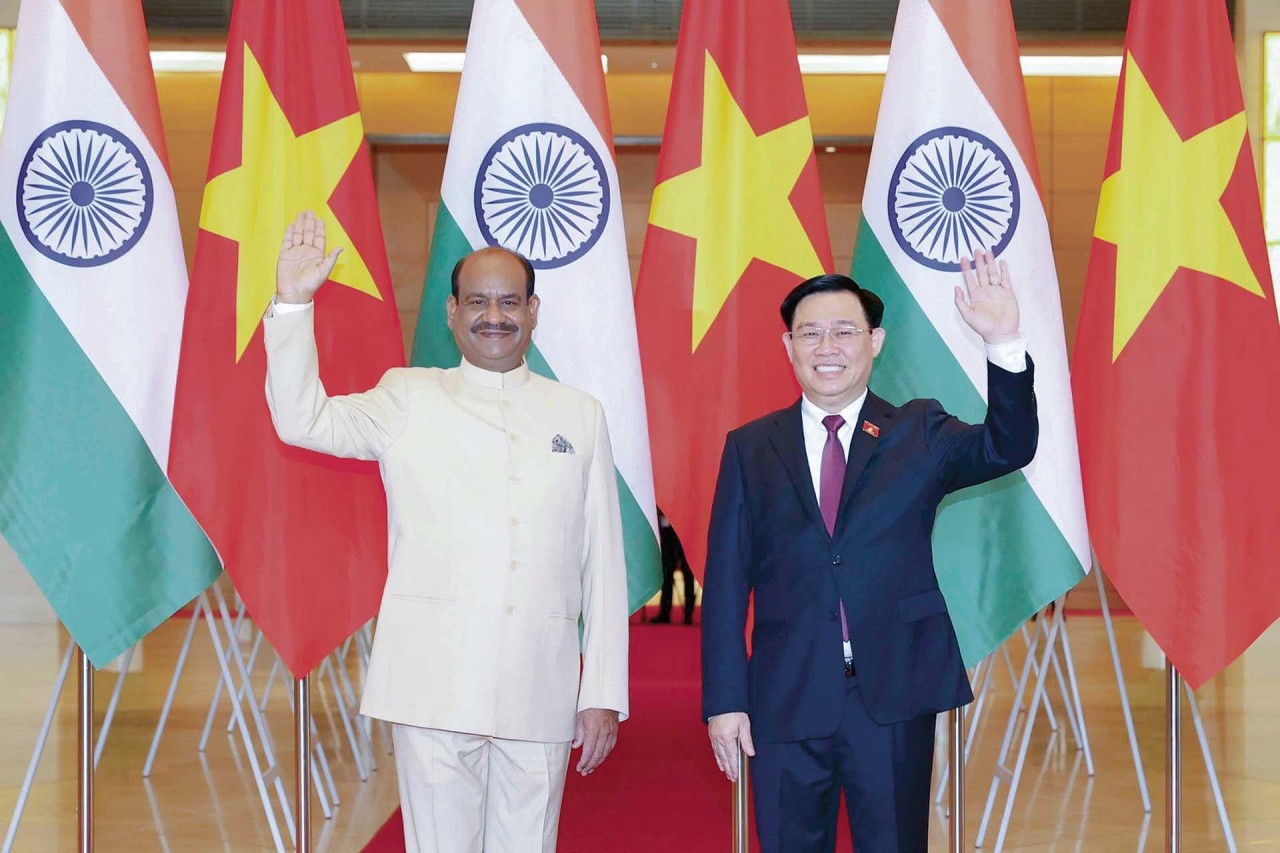 |
| National Assembly Chairman Vuong Dinh Hue hosted a welcome ceremony for Speaker of the Indian Lok Sabha (the lower house) Om Birla. (Photo: VNA) |
These achievements owe themselves to, first of all, the judicious leadership of the Party, the centralized and effective administration of the State, and the solidarity, unity, high determination and immense effort of the entire political system. They are also brought about by the close and well-synchronized efforts between Party diplomacy, state diplomacy and people-to-people diplomacy, and between foreign relations and defense, security, economic and cultural-social undertakings. Under the meticulous leadership and direction of the Politburo, the Secretariat and the Government, the diplomatic service has stayed true to the foreign policy line of the Party and the State, made full use of the characters of “Vietnamese bamboo diplomacy”, kept a close eye on the developments in the world and the region. Through “knowing ourselves and knowing others,” “knowing the tide and the time”, and exercising creativity and flexibility in devising diplomatic strategies and addressing foreign relations issues in ways that ensure “to be firm in principles and flexible in their applications”, we have been able to come up with appropriate measures to make good use of opportunities and address challenges to complete foreign relations tasks.
Mr. Minister, what are the key contents of the 32nd Diplomatic Conference?
The 32nd Diplomatic Conference is an important event, not just to the foreign service itself but also for officials in charge of foreign relations at central committees, ministries and localities. The overarching theme of the Conference is “Build on the vanguard role, develop a well-rounded, modern and strong diplomatic service, and successfully realize the Resolution of the 13th National Party Congress”. This clearly reflects the nature and focus of the Conference.
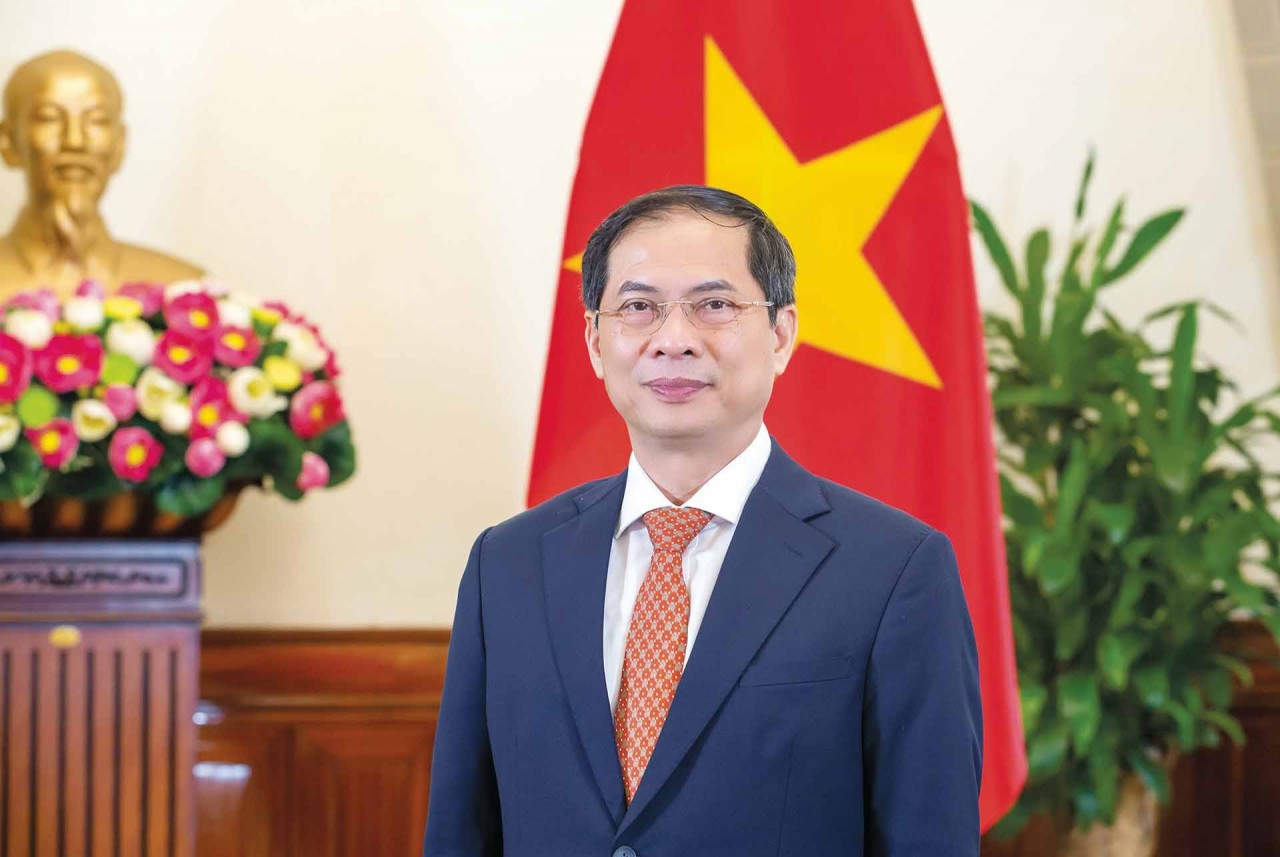 |
| Minister of Foreign Affairs Bui Thanh Son. (Photo: WVR) |
In addition to assessing and forecasting international developments, the Conference will give a full review of the outcomes of the past two years’ work and the half-term implementation of the 13th National Party Congress, to draw from them valuable lessons. The Conference will also seriously take note of the Resolutions, conclusions, directives and projects pertaining to foreign relations issued by the Party Central Committee, Politburo and Secretariat since the beginning of this term. Building upon such basis, we will identify key tasks for the diplomacy and measures to focus on to the end of the 13th term and the upcoming years. The Conference is also an occasion for the diplomatic service to deliberate on a number of key topics and emerging issues pertaining to foreign relations so as to provide inputs for the 40-year review of Viet Nam’s foreign policy line in the Doi Moi period.
The Conference will spend considerable time to discuss in great depth and breadth the way forward, tasks, and solutions in building the diplomatic service. Issues such as personnel, Party-building, policy instruments regarding the foreign service, improvement of the working methods, with the determination to build a strong, well-rounded and modern diplomatic service.












